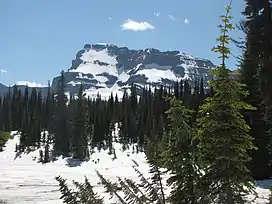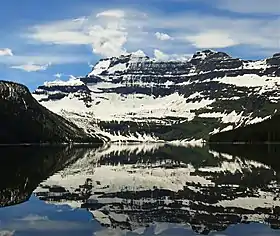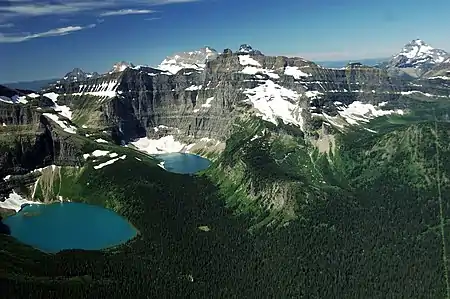Mount Custer
Mount Custer (8,888 feet (2,709 m)) is a mountain in the Livingston Range, Glacier National Park in the U.S. state of Montana.[3] Situated along the Continental Divide, Mount Custer rises more than 3,300 feet (1,000 m) above Lake Nooney, located below the summit to the east. Herbst Glacier is immediately northeast of the peak. The mountain is probably named for George Armstrong Custer, of Custer's Last Stand.[4]
| Mount Custer | |
|---|---|
 Mount Custer from Summit Lake | |
| Highest point | |
| Elevation | 8,888 ft (2,709 m)[1] NAVD 88 |
| Prominence | 1,203 ft (367 m)[1] |
| Parent peak | Chapman Peak[1] |
| Coordinates | 48°58′49″N 114°03′29″W[2] |
| Geography | |
 Mount Custer Location in Montana  Mount Custer Location in the United States | |
| Location | Flathead County, Glacier County, Montana, U.S. |
| Parent range | Livingston Range |
| Topo map | USGS Mount Carter, MT |
Climate
Based on the Köppen climate classification, Mount Custer has in a subarctic climate characterized by long, usually very cold winters, and short, cool to mild summers.[5] Temperatures can drop below −10 °F with wind chill factors below −30 °F.

Geology
Like other mountains in Glacier National Park, Mount Custer is composed of sedimentary rock laid down during the Precambrian to Jurassic periods. Formed in shallow seas, this sedimentary rock was initially uplifted beginning 170 million years ago when the Lewis Overthrust fault pushed an enormous slab of precambrian rocks 3 mi (4.8 km) thick, 50 miles (80 km) wide and 160 miles (260 km) long over younger rock of the cretaceous period.[6]
See also
References
- "Mount Custer, Montana". Peakbagger.com. Retrieved June 7, 2018.
- "Mount Custer". Geographic Names Information System. United States Geological Survey, United States Department of the Interior. Retrieved June 7, 2018.
- Mount Carter, MT (Map). TopoQwest (United States Geological Survey Maps). Retrieved June 7, 2018.
- Through The Years In Glacier National Park An Administrative History, NPS.gov
- Peel, M. C.; Finlayson, B. L. & McMahon, T. A. (2007). "Updated world map of the Köppen−Geiger climate classification". Hydrol. Earth Syst. Sci. 11: 1633–1644. ISSN 1027-5606.
- Gadd, Ben (2008). "Geology of the Rocky Mountains and Columbias".
{{cite journal}}: Cite journal requires|journal=(help)
